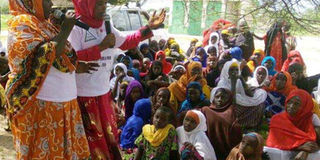Victims speak on living with scars of outlawed but rampant FGM

Tana River Women Representative Rehema Hassan (left) joins activists in campaigns against FGM on September 17, 2018. PHOTO | STEPHEN ODUOR | NATION MEDIA GROUP
What you need to know:
- After the stitching, she says her legs were tied together from waist down to necessitate healing.
- When she conceived, delivery proved impossible, and she says all her first four babies suffocated during birth.
Many are suffering in silence after undergoing unsuccessful-forced female cut. Their faces shine with smiles, but behind the smiles are stories of trauma not every woman has the courage to tell.
Nastehe Aftin, Sadia Hussein and Salima Ware are just three of the thousands of victims of Female Genital Mutilation (FGM) from Tana River County.
Despite being outlawed, the practice is still rampant in the county. These women have risked communal wrath to speak out so as to save other girls from the practice.
Ms Aftin, 28, was just five years old when her parents took her for the cut.
"I did not want the cut, but my parents did and the elderly women who carried out the operation did not entertain my protests," she narrates.
UNDERGO THE CUT
She takes us back to mid-November 1996 when her mother woke her up on a chilly morning to join other girls who were to undergo the cut. They were secluded in a makeshift structure in preparation for the big day.
"The elderly women counselled us on what was expected of us before and after the cut," she narrates.
The teachings lasted a whole day. The operation was to take place early the following day. They were woken up at 5am, and one after the other, they were led to a hut in the bush where those who were to perform the cut were. She remembers how she was held to the ground, her clothes torn and her legs spread apart like an animal for sacrifice.
"They did not use any pain reliever. After the painful cut, they stitched us leaving a pinhole space for passing urine," she narrates.
STITCHING
After the stitching, she says her legs were tied together from waist down to necessitate healing.
The traditional circumcisers would come by to examine the progress on each candidate, woe unto those whose wounds showed signs of infection.
"They would open the wounds, disinfect them by burning the infected area with hot iron, then stitch it again."
For six weeks the girls were kept away from the public until the circumcisers confirmed they were ready to go home.
The day their bound legs were untied was full of joy as the girls tasted freedom. But for Ms Aftin, something was amiss.
LIMPING
She realised that she was not stable to walk. Her hip joint had dislocated as a result of her legs being tied for long.
"I noticed that I was limping, I couldn't stand like I used to, that is when it dawned on me that this practice had damaged my life."
But 28 years later, she has learnt to limp her way into happiness, encouraging girls and women to abandon the cut.
She has composed more than 10 songs against FGM and she is also the founder of Dayaa Women's Group that advocates against the cut.
Ms Ware 32, is another victim of FGM. She successfully underwent the cut and healed fast. But that was short lived when she got married. She lost four consecutive babies as the birth canal had been stitched too narrow.
PAINFUL EXPERIENCE
She remembers that even for her first sexual encounter was a very painful experience.
"I had been stitched in such a way that the space left was very small. Even my first sexual encounter was a nightmare," she says.
When she conceived, delivery proved impossible, and she says all her first four babies suffocated during birth.
Her tribulations worsened when her husband married another woman and divorced her. Little did she know that by the time she was leaving her marital home, she was expecting another baby.
FISTULA
However, this time, she relocated to live with her sister in Hola town. Early this year, with the help of medics at the Hola Referral Hospital, she held her bundle of joy, a baby girl, in her hands.
"This child wiped away my tears and my shame, I can't give her more than what I desire for every girl in my community, curse be upon me if I shall take her through the blade, "she says in tears.
These are just but two of the many women in various ethnic groups in Tana River County that are living with the scars of FGM. Many of them have fistula. The national government has outlawed FGM but it is still rampant.





